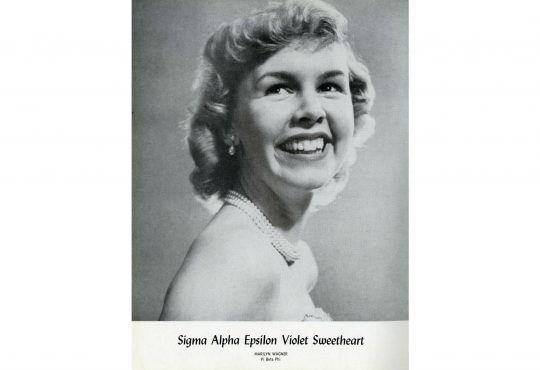On Tuesday, Feb. 24, hundreds of students piled into Schneebeck Concert Hall for the consent workshop put on by Babeland, a sex toy shop in Seattle that focuses on personal empowerment and community education. Several campus groups hosted the event, including WIXEN (a club focusing on women’s intersectionality, empowerment and narratives), Student Actitivities, SIRGE (a leadership position that advances sexuality issues, relationships, and gender education) and Greek Life.
As part of an effort to introduce more sex positive education into Greek Life, all sorority and fraternity members were required to attend the workshop in place of their usual Monday night chapter meetings. Two Babeland employees, Megan and Shannon, led the workshop, utilizing a PowerPoint presentation and short role-plays in order to convey their points. Shannon is also a licensed mental health therapist.
One main focus was illuminating exactly what consent is. They stressed that consent consists of a shared dialogue, an ongoing process that requires the active input of all participants, and that it can never EVER be assumed. Silence does not mean consent. Consent must never involve coercion and boundaries made can always be renegotiated or revoked. It is the responsibility of the community and of every individual to make sure that consent is practiced not only during sexual encounters, but also in everyday life.
Megan and Shannon also emphasized that it is also important to ask what consent means to you personally, just as it is important to understand that every person’s definition of sex is different. They stressed that sex is not always about the end goal of orgasm. In terms of understanding sex, “You get to fill in that blank. Definitions are fluid,” Shannon said. “It’s about the journey, not the destination.”
Because definitions differ, communication is essential to any consensual relationship, and in fact makes you a better lover. The presenters suggested that even though talking about sex is stigmatized and can be somewhat uncomfortable, partners should discuss their fears, desires and concerns and ask for what they want.
It is key for anyone entering into an interaction to be aware of what they want and whether they trust the other person(s) emotionally. Checking in during as well as after sex by asking questions can help clear up any miscommunication.
Part of good communication is listening, which includes paying attention to explicit verbal cues as well as body language. Participants in any relationship of consent can agree on pre-negotiated signals, such as tapping, grabbing, etc.; they can redirect physicality based on needs; they can use eye contact to check in on how the other person/people are feeling.
Nonverbal communication can be tricky, though, and you should be careful about getting into murky waters. “Just because someone’s aroused, it does not mean consent,” said Megan.
When it comes to consent, being comfortable with saying no is key. It is empowering to be able to tell someone both what you want, as well as what you don’t want. If you don’t have a condom, dam or glove but don’t want a sexually transmitted infection, you can say no to sex. If you don’t want to hurt someone’s feelings but you are just not in the mood, you can still say no to sex.
Conversely, if you really want to get with someone and they say no to you, you must respect their boundaries, because you are responsible for continuing a relationship of consent. Saying no, in the context of consent and empowerment, can be just as sexy as sex itself.
One problem with the workshop was the difficulty the presenters had with addressing the issue of consent in terms of substance use. Sex under the influence is an issue that frequently leads to miscommunication, non-consensual encounters and even sexual violence. It is also something that for many college students is a fact of life.
Rather than talking about specific boundaries and tools to use in hashing out these gray areas, though, Megan and Shannon chose to stick with the University’s policy that sex under the influence of anything at all can never be consensual.
When the floor was opened up for questions they were pressed further about their opinion on the matter.
“As a rule, it is black and white, but it tends to be an ethical and moral gray area,” Shannon said. They suggested that while alcohol (and drugs) makes it hard to give thoughtful consent, it is all about respect.
You can pay attention to how much everybody has consumed and establish boundaries beforehand, but in the moment, it can be hard to tell what is the right thing to do. This is a discussion that needs to be carried forward by the University community rather than glossed over as a matter of policy.
In discussions after the workshop, this and several other problems were brought up. Even though most people agreed that Babeland’s version of consent education far exceeded that of the Green Dot program held during orientation—in which consent is hardly mentioned—there was still some lack of engagement as evidenced by the many Greek Life members who still insisted on sending Snapchats during the presentation. There need to be more regular and engaging programs for a community of consent to flourish at the University of Puget Sound.
Khalila Fordham, a doctoral psychology intern at Counseling Health and Wellness Services, wants to work with the community to promote a safe and sex-positive culture.
She hopes to create a workshop series that expands on the topics brought up in the consent workshop, and wants ideas and feedback from students about what the campus needs in terms of positive and enlightening sex education. Email her your thoughts and ideas directly at kfordham@pugetsound.edu.






